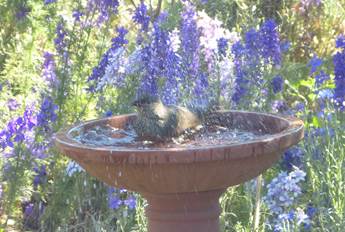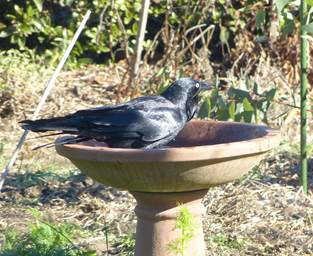Yes, I was wondering that also. Its only the feral pigeons which give off this substance, I think.
None of the others appear to , including Satin BB

and Raven

etc. etc
Many thanks for all the information and suggestions.
Robin
From: John Harris [
Sent: Thursday, 31 January 2019 1:41 PM
To: 'Canberra Birds'
Subject: Re: [canberrabirds] oil and feral pigeons?
I gladly bow to powder down rather than crop milk!!! Just one question. Does this mean other birds which visit Robin’s bird bath don’t have powder down? (eg Crimson Rosellas)
Alison wrote what I was going to suggest. If you do an internet search on
powder down,
you will find a lot more information.
From:
[m("iinet.net.au","arowell");">]
Sent: Thursday, 31 January, 2019 11:54 AM
To: 'Robin Hide'; 'Canberra Birds'
Subject: RE: [canberrabirds] oil and feral pigeons?
I think you’ll find this comes from ‘powder-down’, special small body feathers that break down into a slightly greasy talc-like substance that some birds use in feather dressing (as these happy pigeons seem to be doing). I’ve also seen
powder down on herons and parrots, and a very clear powder outline of the flight feathers where a pigeon has hit a window. It gives a whitish bloom to the feathers of some birds – I knew a rescued Galah that hadn’t learned to distribute its powder properly
and its pink feathers were much brighter than its better-groomed mate.
Alison
According to Wiki, pigeons are one of several bird families that lack a
uropygial gland, “informally known as the preen gland or the oil gland, is a bilobed sebaceous
gland possessed by the majority of birds”
https://en.wikipedia.org/wiki/Uropygial_gland
However, when (unwelcome) feral pigeons use our bird bath, they leave the water surface covered with a whitish, I assume, oily substance, as shown here:
In contrast, the water remains clear after use by all other species (Red Wattle Birds, Magpies, Magpie Larks, ravens, Crimson Rosellas, starlings , etc etc).
Any suggestions about the source of this substance?
Robin Hide
With the current heat , even the rarely visiting choughs wanted water:

